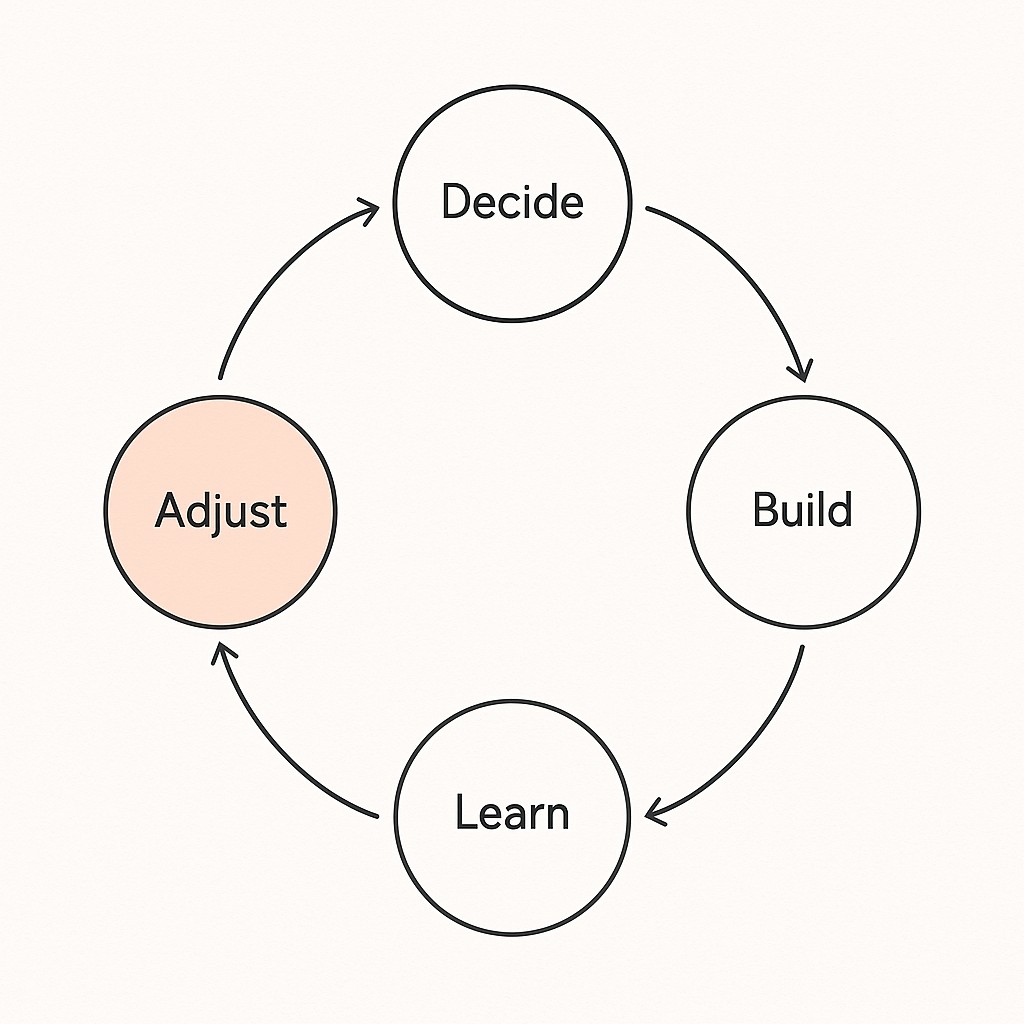Overcome Imposter Syndrome in Tech: Build Confidence by Shipping Under Uncertainty
Overcome Imposter Syndrome in Tech: Build Confidence by Shipping Under Uncertainty

Starting Line: The Unfamiliar Seat
I still remember my first days stepping into the director’s office. New badge, new acronyms flying around, everyone looking to me for a plan. The spotlight felt sharper than I’d expected. I kept thinking, one slip or wrong answer and they’ll figure out I’m just learning too. Those moments were real—not dramatic, just honest about how exposed you can feel when the stakes go up.
On paper, I’d led teams before, shipped projects that mattered. But I hadn’t worked in this industry, and that imposter syndrome new role feeling was real. I’d never solved these particular problems or mapped out the quirks unique to this domain. It’s humbling to start over, no matter how many cycles you’ve seen elsewhere.
If you’ve ever tried to overcome imposter syndrome in tech, you know the drill. Those internal questions that hang in the air when you’re supposed to have it all mapped out: What if I can’t figure it out? What if everyone sees I’m fumbling? If you’re asking yourself any version of these, you’re not alone.
Here’s the part I didn’t expect. Every top performer I watched—people I’d have bet were bulletproof—felt that same uncertainty. The smartest, most capable people I knew admitted to doubting themselves, especially when the tasks demanded speed and good judgment in the face of ambiguity. Imposter feelings weren’t a signal to retreat; they were proof we were paying attention, engaged, and stretching outside the familiar. Nobody has it all dialed in, not at this pace.
I used to think imposter syndrome meant I didn’t belong. Now I know it just means I’m paying attention. The key isn’t knowing everything before you move. Progress and confidence come from learning quickly and shipping work, not from solving uncertainty before it starts.
The Mechanics of Hesitation and the Real Meaning of Expertise
The pressure to get things right only intensifies when you’re moving fast and the boundaries are unclear. When change is constant and constraints shift on you mid-sprint, your brain’s reflex is to hit the brakes, double-check, start second-guessing basic things. Here’s why. When the risks are defined by soft information, caution kicks in harder—meaning ambiguity feels heavier than pure probability. It’s not just about spotting technical red flags. It’s the weight of not knowing what might count as a red flag at all. That kind of uncertainty plants doubt right where you need conviction.
This is where it helps to reshape what “expertise” actually means. It’s not about knowing everything—it’s about knowing how to find answers. The strongest engineers I’ve worked with model an engineering growth mindset, not encyclopedic recall. They’re relentless seekers and fast implementers. Confidence isn’t built on having every answer ahead of time. It grows as you gather evidence in motion, make decisions, and watch what happens.

But there’s a catch—overcoming perfectionism in tech matters because the chase for perfection can quietly eat your momentum. There’s a promise in holding back: that one more day, one more check, will make the result bulletproof and your reputation safe. In my experience, all it actually does is delay impact. Perfection-chasing often comes bundled with fear of exposure and over-preparing—classic signals tied to imposter feelings and low self-esteem. I used to spend days refining proposals, imagining every possible critique, and it rarely led to a better outcome. Luck doesn’t create consistent success. What does? Repeating the loop: decide, build, learn, adjust.
Six months ago, I caught myself rewriting an email draft for forty minutes, convinced I was missing some nuance everyone else would spot. I sent the first version anyway, mostly out of frustration, and nobody mentioned a thing—except to thank me for the quick turnaround. We notice our own wobbles more than anyone else does.
You might still worry that moving forward before you feel ready could make you look exposed. That worry is real—I’ve lived it. But the playbook I’ll lay out next will help you protect your reputation while building real momentum. Let’s get into what actually works.
Operating Principles Under Uncertainty
When you’re facing ambiguity, momentum matters more than having a perfect map. I stick to small, reversible bets. Make a decision that’s easy to unwind later and keep moving. That often means setting a timer: “I’ll poke at this API for twenty minutes, then decide what comes next.” Timeboxing stops analysis paralysis in its tracks. Guardrails—like requiring a code review or flagging experimental features—shrink the blast radius, making it safe to act first, learn second. I’ve found more progress comes from turning fuzzy problems into clean actions than from waiting until everything’s clear.
If I don’t know where the gaps are, I ask. Sometimes that means typing a specific question into Google (“event-driven architecture in healthcare”) and skipping past the first paid ad. Sometimes it means pinging a colleague directly, instead of thinking I should already know. No shame in using what’s out there—those quick searches and direct questions show you’re oriented toward learning, not pretending. You feel stuck longest when you guess silently.
Last weekend I swapped switches in a mechanical keyboard just to figure out what “good” actually felt like. My bias for linear switches only solidified after a few clunky test runs and finally settling on parts that fit my typing. Now, that’s the same loop we use on teams—experiment, sense, clarify, repeat. Small changes, clear answers.
Another principle I’ve leaned into: ship useful slices before you feel ready. It’s tempting to wait for the “final” solution, but that’s a trap—especially early in a new industry, when the path to quality is murky. Instead, I focus on prototyping, shadowing existing workflows, or launching partial releases that generate real-world feedback. Every early version exposes what’s broken, what works, and how teammates actually react. There’s a pattern: once you ship before you feel ready, you create proof—actual data, not theory—about what’s missing and what matters most. Those moments build real confidence. I keep looping back: decide quickly, minimize risk, ship something, then let the evidence guide next steps. Shipping early isn’t reckless. It’s clear, incremental risk management.
One last thing. Track what you ship—call it a brag file if you want. List every feature, every fix, every experiment, along with the outcome and what you learned. The running log isn’t just for reference. It’s confidence on paper. When doubt sneaks in, or a teammate wonders if progress is happening, you’ve got receipts. Keep it up to date. You’ll see momentum—real evidence—take the place of uncertainty.
Tactics to Overcome Imposter Syndrome in Tech—Turning Anxiety into Action
When anxiety about getting it wrong starts to slow me down, I default to one simple loop: Decide, Learn, Ship, Measure, Adjust. That’s it. Pick an action—sometimes it’s just a rough draft or minimum-code experiment—then ship it somewhere safe, measure what happens, and use the outcome to adjust. The big shift is that you don’t need every piece up front. Each small closed loop teaches you what’s missing fast, and the compound effect of those cycles beats waiting until you feel bulletproof.
Here’s something I do a lot, especially when pressure is high and the problem’s fuzzy. I’ll say, “I see a few options here, but what’s most relevant to us right now?” Or, when a decision feels stuck, “Is there a path forward that lets us test assumptions without locking all the way in?” If you’re unsure, try leading with “What am I missing?” or “What’s the risk if we go this route first?” These scripts don’t fake certainty. They show you’re thinking ahead and invite others into the problem.
Risk slicing sounds fancy, but mostly it’s about designing for smaller, safer failures. Use feature flags so you can turn new code off instantly. Run a “shadow mode” so your new logic sees real usage, but doesn’t actually change product behavior until you’re sure. Always have a rollback plan. Uncertainty isn’t the enemy. Uncontrolled exposure is. Frame it that way for your team—our job isn’t to know everything, but to make not-knowing safe enough to ship.
Applying this directly to ML or AI work makes the loops almost obvious. Say you’re shipping a new model. Start with offline evaluation (see if it even works on yesterday’s data). Next, run that model “in the shadows,” meaning it gets real-time input, but no user ever sees its output yet. Once things line up, stage your rollout—maybe just to 5% of traffic, gated by a feature flag, ready to roll back if drift gets weird. At each turn, you measure. Accuracy, drift against baseline, edge failures. What you ship early isn’t perfection—it’s the start of a feedback loop that points straight at what’s still missing or what needs tuning. Each controlled release is itself a learning system.
If you run a team, your biggest lever is normalizing uncertainty out loud. Ask questions early, model incomplete-but-useful work, and praise shippable progress. Make it default-safe for your team to move before answers are final. Here’s why it matters. Teams with high psychological safety didn’t just move faster—they actually beat sales targets by 17%, while those with lower safety lagged by 19%. You set the tempo. Show them progress over perfection, and they’ll carry it forward.
Momentum Rituals and Mindsets to Move Forward
If you’re staring at uncertainty today, here’s one concrete step for your role. Software engineers—if imposter syndrome for engineers is slowing you down, push a working branch live for review, even if it’s partial. ML/AI practitioners—run your newest model shadowed side-by-side and log the misfires. Leaders—kick off a quick alignment thread on the one blocker your team keeps mentioning and decide the next move together. No need to wait until you “feel ready.” Act, see what shows up, learn, ship.
Every week, set aside time for two fast rituals: a fit-for-purpose retro (no slides, just one round of “what surprised us?”), and jot down an evidence log—actual features shipped, experiments that taught you something, feedback you got. Celebrate any work that made it into the world, no matter the slice size. Run these consistently and you’ll find hesitation shifts toward tested confidence rather than more planning.
Back when I started keeping my brag file, I honestly doubted I’d have enough to fill a page. Now, some weeks it’s just a single line—“paired with Kevin, fixed noisy build errors”—but those quiet additions are sometimes the ones I look at after a rocky sprint. A log like that turns wishful thinking into evidence.
Ship ideas faster without overthinking by using our AI to draft technical posts, docs, and updates, then iterate with your goals, constraints, and tone until it’s ready to share.
Catch yourself in that “I don’t know enough yet” loop? Swap it for self-talk for imposter syndrome: “No one does. I know how to figure it out.” Remind yourself of what you’ve already shipped—actual data, not theory. Self-doubt is just alertness. If you hear, “What if I can’t?” reframe it: “What can I learn in the next hour?” Self-awareness isn’t a liability when you turn it into actionable curiosity.
The one thing I still wrestle with: I know this approach works, but I still sometimes fall back into collecting too many inputs before I let myself move. Maybe that tension never totally goes away.
So, the next uncertain moment isn’t a signal to freeze—treat it as a green light to overcome imposter syndrome in tech and move. Decide today, ship something usable, and let real evidence build your confidence. You don’t need perfection to create momentum. You just need to act now.
Enjoyed this post? For more insights on engineering leadership, mindful productivity, and navigating the modern workday, follow me on LinkedIn to stay inspired and join the conversation.
You can also view and comment on the original post here .
